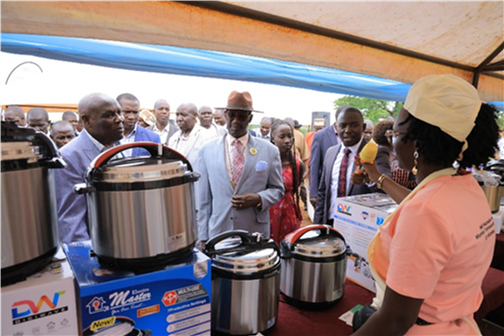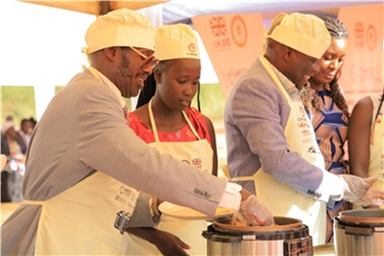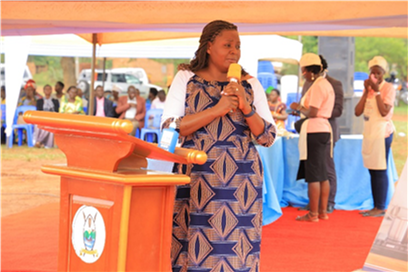On March 20, 2025, the Kingdom of Buruuli in Nakasongola became a focal point in Uganda’s clean energy transition by launching an ambitious electric cooking initiative. The Ministry of Energy and Mineral Development, in collaboration with the National Renewable Energy Platform (NREP) – Uganda and Modern Energy Cooking Services (MECS Programme), spearheaded an electric cooking demonstration under the UK-funded Behavioral Change Communication for Electric Cooking (BCCeC) Project. This high-profile event was graced by Hon. Sidronius Okaasai Opolot, the State Minister for Energy, and hosted by His Royal Highness Mwogezi Butamanya Constantine, the Isabaruuli, alongside key ministers of the Buruuli Kingdom. Designed to encourage a shift towards cleaner, safer, and more efficient cooking solutions, this initiative represents a major step in reducing reliance on biomass fuels, mitigating environmental degradation, and improving public health. The demonstration set the stage for a cultural transformation, proving that modern electric cooking technologies are both viable and beneficial for households in the region.

Key Highlights & Observations
The electric cooking demonstration in Buruuli was an engaging and hands-on event designed to promote modern clean cooking technologies as viable alternatives to traditional biomass-based methods. The Uganda National Alliance on Clean Cooking (UNACC) presented a variety of energy-efficient cooking appliances to the audience. Initially, many attendees were doubtful about whether these modern appliances could effectively cook their staple foods.
To dispel these doubts, a live cooking session was organized, featuring key dignitaries, including His Royal Highness the Isabaruuli, the State Minister for Energy, the Member of Parliament for Nakasongola, and the LCV Chairperson. Each of them took turns using electric pressure cookers (EPCs) to prepare popular local dishes such as cassava, kalo, beef, and molokoni (cow hooves). The demonstration proved successful, as the meals were cooked efficiently without the smoke, soot, or physical effort associated with firewood and charcoal. This practical showcase transformed perceptions, with many in the audience expressing a newfound interest in adopting electric cooking.
A particularly powerful moment was an address by Mrs. Oliver Mbakolaki Buyinza, the Minister for Gender and Women Empowerment in Buruuli Kingdom. She passionately highlighted the challenges women endure due to dependence on firewood, including health hazards from smoke inhalation and the significant time spent gathering fuel. She encouraged women to embrace electric cooking, emphasizing its potential to improve their well-being, save time, and create economic opportunities. Her speech struck a chord with many attendees, inspiring them to consider making the transition.
However, some cultural and political leaders voiced concerns about the reliability of electricity in the area, noting that an unstable power supply could hinder the large-scale adoption of electric cooking. In response, the State Minister for Energy reassured the community that initiatives were underway to enhance electricity stability in Nakasongola, reaffirming the government’s commitment to making clean cooking accessible and practical for households.

Key Challenges & Lessons Learned
While the event successfully demonstrated the potential of electric cooking, several challenges remain. The primary concern is power instability, which continues to be a barrier to full-scale adoption. Without a reliable electricity supply, households may be reluctant to invest in electric cooking appliances. Additionally, affordability is a pressing issue, as many families may struggle to afford the upfront costs of purchasing electric pressure cookers and other clean cooking technologies.
Despite these challenges, the event reinforced valuable lessons. First, hands-on demonstrations and leadership participation are critical for shifting public perceptions and building trust in new technologies. Seeing respected cultural and political leaders actively using electric cookers played a crucial role in encouraging acceptance. Second, integrating clean cooking advocacy with gender empowerment messaging strengthens the impact, as demonstrated by Mrs. Mbakolaki’s compelling appeal to women.

Conclusion
The launch of electric cooking in the Buruuli Kingdom is not just about introducing new technology it is about transforming lives, protecting the environment, and promoting healthier communities. Moving forward, efforts must focus on improving electricity reliability, exploring financial support mechanisms to make appliances affordable, and sustaining community engagement through continuous education and awareness campaigns.
As His Royal Highness the Isabaruuli eloquently stated at the 2024 Renewable Energy Conference & Expo, “We need to ignite a movement to protect the environment with the same passion we protect our traditions.” The launch of the e-cooking program in Buruuli is a step in that direction, signaling the beginning of a cleaner, healthier, and more sustainable future for the region.



